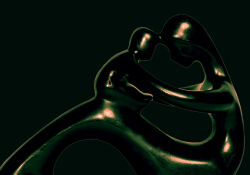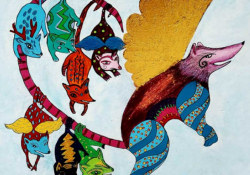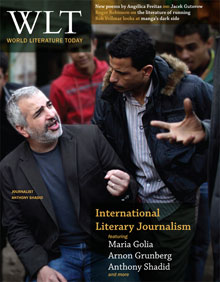In Search of a Man for Friendship and Possibly More
It’s Christmas, and since it’s Christmas it seems repugnant not to have a steady boyfriend to give one gifts. A boyfriend, in short, who will take you to the Ebro River Delta from time to time, a place where boyfriends tend to take their girlfriends. So I decide to go to a dating agency to see if they have anything for me.
The psychologist informs me that every time they call me at work to propose a date, they will say that it's "a friend calling." I don't care about that at all. I work alone, and I don't keep secrets from myself.
The psychologist who greets me, Eva Larraz, invites me to enter her office. On the table there are two credit card machines to process Visa cards, calendars that are stamped with the company name, and bookmarks with the phrase “There is an ideal moment to love and be loved: Now.” Before we begin, I ask her if she has a partner, and she tells me she does. Then I ask her if the two receptionists that greeted me when I entered each have one, and she tells me that one does and one doesn’t. And then we start the interview. First of all, Eva explains the difference between an agency like hers and the personal ads in newspapers. She tells me that only people who are looking for a stable relationship come here, not the ones wanting occasional flings. She also informs me that every time they call me at work to propose a date, they will say that it’s “a friend calling.” I don’t care about that at all. I work alone, and I don’t keep secrets from myself.
And then we move on to the test. She asks me my telephone number and the date and hour I was born. “Why the hour?” I demand. “Because that way we can know the ascendant sign of your zodiac chart. A client could ask for the information to see if you are compatible.” I tell her not to bother. The man who will take me to the Ebro Delta wouldn’t be so ridiculous as to ask about that. Then I give her my address and my weight. She also notes how long it has been since I’ve had a stable relationship, my level of education, if I speak other languages, have children, live alone, have siblings, where I am in the birth order, and if I am religious (I pretend I am an apostate, because I renounced religion out of boredom). When she asks me if I consider myself a homebody, I don’t know what to say. It depends on the day. Next she wants to know if I smoke and if I drink alcohol, if I like animals, and what kind of assets I have. (I don’t dislike animals, and I have an apartment and a scooter. I drink, but I don’t smoke.) I also confess to her how much I make each year, the status of my health, and that I lean to the left politically.
“Now, Empar, we’ll find out what you do for fun,” Eva says, with her saccharine voice. And she clarifies that I should rate a list of activities from zero to five, according to the frequency with which I enjoy them. “Classical music,” she asks. I think I give it a three, exaggerating. I give theater a zero, reading periodicals a five, restaurants get a five, and concerts and exhibitions receive a three, but only so I don’t leave a bad impression. “Do you like to go for walks?” she asks. I say yes, but I could have easily said no. She continues with a list of sports, and I’m supposed to answer whether I would play them in case “the guy” does. I know I am closing some doors, but I say no to golf, cycling, horseback riding, and swimming. (It seems that there aren’t any widowers or divorced guys who spend the day at the bar.) She asks me what I do during my free time, and I give the most insipid answer in the world. I maintain that blandness when I have to describe my ideal vacation.
"How important is sex to you in a stable relationship?" she wants to know. If I say five, will that look bad?, I wonder. In the end, I rate it a four, but only because I'm feeling romantic this year.
“What don’t you like about your personality?” she ventures. “I like everything,” I tell her. And it’s the truth. When she asks me about my life goals, I declare that I don’t have any. “How important is sex to you in a stable relationship?” she wants to know. If I say five, will that look bad?, I wonder. In the end, I rate it a four, but only because I’m feeling romantic this year. “Okay, Empar, now we’ll talk about the guy. . . . What age would you like him to be?” I tell her someone older. She also asks me about his height, to which I respond “taller,” and his cultural level, for which I indicate “high.” Whether he’s divorced, has kids, or is a widower doesn’t matter to me. I explain to her that I also don’t care much about his looks: “Of course, because you value his personality more,” she presumes. But then she immediately adds, “And his character?” I still don’t know what to say. “What do other clients say?” I want to know. “Well . . . If you like a guy who’s more fun, more meticulous. . . . What they usually ask for is that he be faithful, focused, and that he have a personality. . . .” That. That is what I want.
Next I have to write a phrase on a blank sheet of paper for the handwriting test. And then it’s time for the personality test, which will determine my character. I just have to answer “yes” or “no” to a series of affirmations. For example, “I’m passionate about causes that promote justice and prevent amorality and ethical failing.” I don’t know what to answer. I also don’t know how to respond to “I use any form of artistic expression (poetry, painting . . .) as a way to channel and express my feelings and creativity.” For my own good, and yours, I sincerely hope not.
Finally, she talks to me about the most appropriate candidate for me, someone who is looking for a thin, happy, optimistic woman with a sense of humor and who is also a good, sincere, and real person. (She thinks I’m that woman.) “So, we’ll start with him,” she tells me. But she doesn’t give me his phone number, because for that I would have to sign a paper and pay the fee. Therefore, I am asking the “guy” if, by chance, he reads this article, that he be less than ethical and write to me immediately.
Translation from the Catalan
By Novia Pagone
Editorial note: “Busco senyor per amistat i el que sorgeixi,” in Busco senyor per amistat i el que sorgeixi, by Empar Moliner (Barcelona: Quaderns Crema, 2005).
Editorial note: To read more about Empar Moliner and other female Spanish journalists, see “Telling Stories in Contemporary Spain: A Survey of Women Writing Literary Journalism” online and in the March print edition of WLT.










